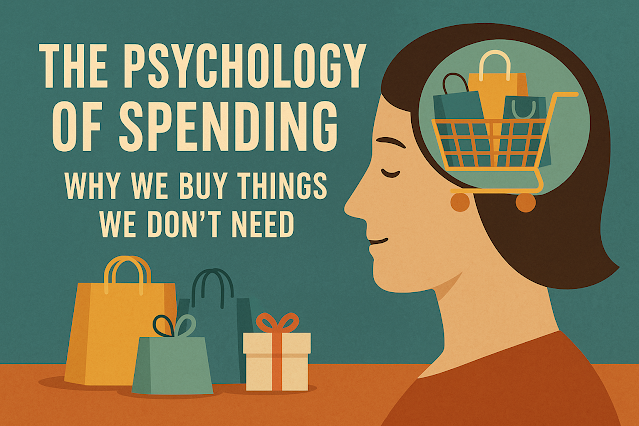The Psychology of Spending: Why We Buy Things We Don’t Need
In today’s digital world, it's easier than ever to spend money — even when we don’t need to. One tap, one swipe, and boom — your money’s gone. But why do we buy things we know we don’t need?
This article breaks down the psychological reasons behind impulsive spending and teaches you how to take control of your wallet.
🧠 1. Emotional Spending: Buying to Feel Better
One of the biggest reasons people overspend is to fix their emotions. Feeling stressed, sad, or bored? Buying something gives a quick dopamine hit — but it doesn't last.
What to do instead:
Take a walk, journal, call a friend, or listen to music. Let your brain release dopamine in healthier ways.
🛒 2. The Illusion of Saving: “It’s on Sale!”
We often fall for discounts and think we’re saving money by buying. But remember — spending Rs.1,000 on a 50% off item is still spending Rs.1,000 if you didn’t need it.
Next time: Ask yourself, “Would I buy this if it wasn’t on sale?”
📱 3. Social Media Influence
Instagram, TikTok, YouTube — everyone is showing their latest hauls, gadgets, or vacations. This triggers a psychological effect called “FOMO” (Fear of Missing Out) and pushes you to buy things just to fit in.
Solution: Unfollow accounts that push spending or unrealistic lifestyles. Follow people who talk about budgeting and saving.
✅ Check out: How to Start Budgeting Easily
🧼 4. Retail Therapy: A Temporary Fix
Many people shop because it gives them a sense of control, especially during uncertain times. This is called retail therapy, and while it feels good, it’s temporary.
Instead of buying:
Try organizing your room, completing a small task, or cooking something new — activities that give real satisfaction.
🧠 5. Cognitive Bias: “I Deserve This”
After a tough day or achieving something small, we say: “I worked hard — I deserve it!”
This reward mentality makes us justify useless purchases.
Tip:
Reward yourself, but set a limit — e.g., treat under Rs.500 max, once a week.
💳 6. Easy Payments & Credit Cards
With “Buy Now, Pay Later” services and credit cards, spending feels painless. But the debt adds up silently.
Fix it:
Switch to cash or debit for daily use. You’ll spend more mindfully.
🏦 Read more: How to Save Money Fast with Smart Planning
🏪 7. Environment Triggers
Walking into a mall, scrolling Amazon at midnight, or just seeing a SALE sign can trigger spending without thinking.
Solution:
Avoid “spending zones” when bored. Uninstall shopping apps you don’t need.
🎯 8. No Clear Financial Goals
When you don’t have savings targets, you don’t have a reason to stop spending.
Action Step:
Set a savings goal today — Emergency Fund, Rs.10,000 buffer, vacation fund — anything.
👛 Not sure where to start? Read: How to Build an Emergency Fund from Scratch
🧘♂️ 9. Lack of Mindfulness
We often spend money while distracted — scrolling, walking, multitasking. The result? Random stuff we didn’t need.
Fix:
Before every purchase, pause and ask: Do I really need this?
🛑 10. Peer Pressure & Comparison
Friends, colleagues, and family can influence your spending. Maybe they buy the newest phone or eat at fancy restaurants.
Remember:
Your goals, your pace. Financial peace is better than temporary flex.
✅ Final Thoughts
Understanding the psychology of spending is the first step to financial control. You don’t need to live cheap — you just need to spend smart.
Start tracking your habits, set goals, and take small steps.
For more real-world money tips, visit SavvyCoin regularly — your trusted partner in financial freedom.

